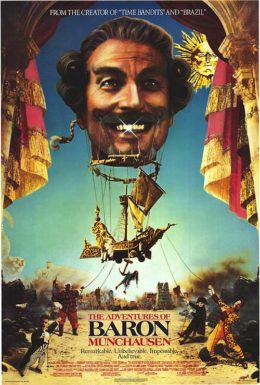Welcome to 2018, Tor.com! How about a new Movie Rewatch of Great Nostalgia to celebrate? That’s what I thought you said!
Today’s entry is that grand disaster of 1988: Terry Gilliam’s The Adventures of Baron Munchausen!
Previous entries can be found here. Please note that as with all films covered on the Nostalgia Rewatch, this post will be rife with spoilers for the film.
And now, the post!
KATE: I wanna do Baron Munchausen next.
ME: But I’ve never seen it.
KATE: Don’t care.
ME (to Liz): Have you seen it?
LIZ: I’ve… sort of seen it? In bits and pieces?
ME: Well, so…
KATE: Nope, don’t care.
ME: But—
KATE: AHHHH DON’T CARE
Sister Kate, it turns out, has pretty strong opinions on the nostalgitivity of The Adventures of Baron Munchausen, and since I let Liz-via-husband-Pete talk me into Xanadu, I figured it was only fair to give this one to Kate, so here we are.
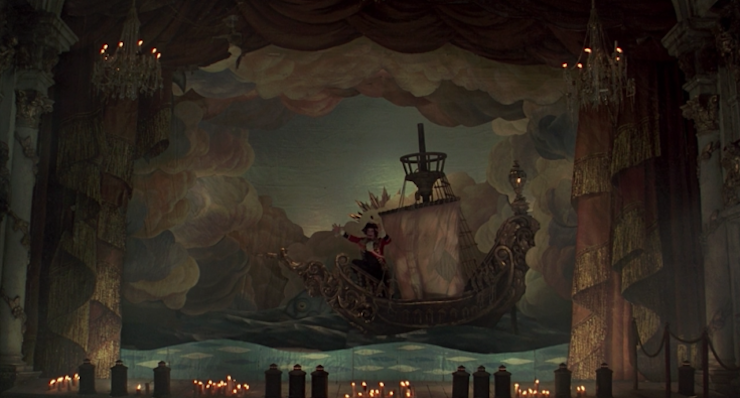
It’s interesting that both of these films were, from a box office perspective anyway, more or less total bombs; the difference is that unlike Xanadu, which even its most ardent fans would not argue is an actually good movie, Munchausen received critical accolades on release and was nominated for multiple awards. Yet, it tanked even harder than Xanadu did, earning $8 million domestically on a reported $46 million+ budget. Ouch.
Which just goes to show you, box office revenues are a pretty lousy metric by which to judge the quality of any given movie. It turns out that if your distributing studio is bound and determined to kill your film, your film will no longer pine for the fjords no matter how awesome it is. The in-fighting at Columbia, on top of the enormous production delays and snafus that occurred during shooting, meant that the experience of making Baron Munchausen was a pretty hellish one for everyone involved, particularly director Terry Gilliam, whose reminiscences on the project read rather like those of a weary old soldier recounting his battles of yesteryear. Which, considering the plot (and theme) of the film, is either ironic or apropos—or both.
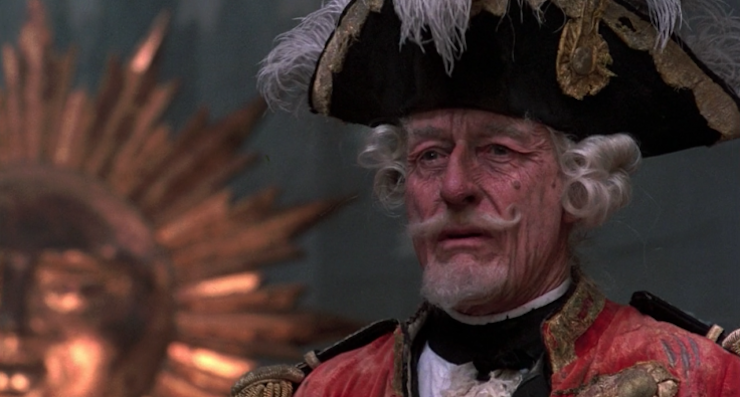
KATE: It was a complete fluke that I saw it. I was maybe 7 or 8 years old, and it came on HBO during one of the free trial periods they used to do, and I didn’t even really understand what was happening, but it didn’t matter; I just sat there and watched it with my mouth open, in awe.
By contrast, I had barely ever even heard anyone talk about this movie at all, then or now, and really knew almost nothing about it. This is weird when you consider that Gilliam’s previous film Brazil (1985) is one of my favorite movies. This is even weirder when you consider that Gilliam considers Brazil to be part of a loose trilogy with Munchausen and his 1981 film Time Bandits… the latter of which I also have never seen.
LIZ: Wow, you are fired from 80s Nostalgia Film Club.
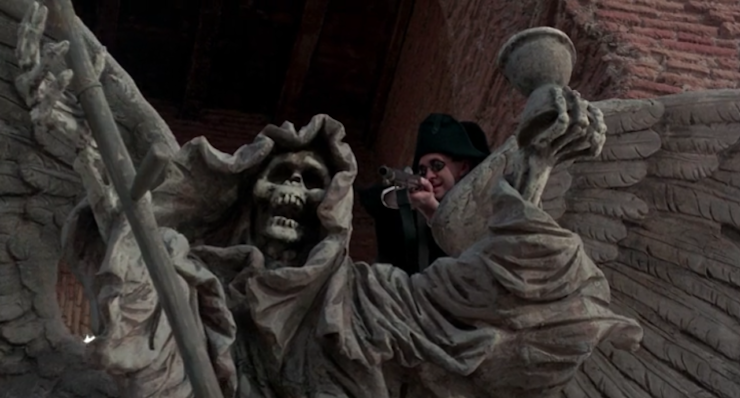
I really am. Look, I have no idea how that happened. My only excuse is that I discovered Brazil at complete random, in college, a decade later, and at the time the proto-Internet had not evolved to the point of being able to hock up that connection in one big Google loogie. I don’t think I even made the connection of its director with Monty Python until years later. It was a simpler time, kids, what can I say.
Nevertheless, once I did finally sit down and watch The Adventures of Baron Munchausen, some thirty years after it was made, the aesthetic and thematic connections to Brazil (and, I presume, to Time Bandits, but I can’t speak to that) were screamingly obvious.
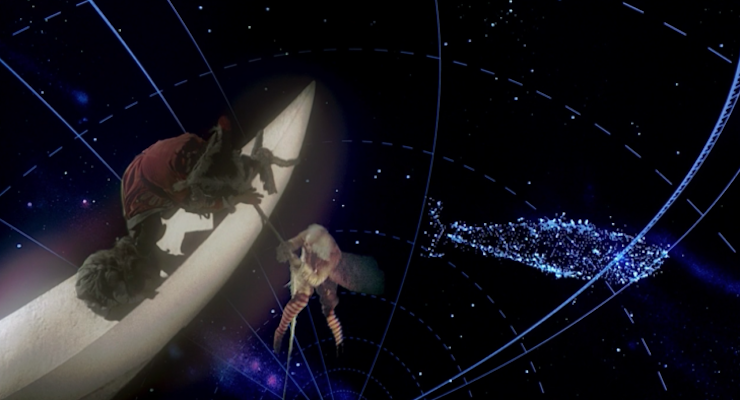
Terry Gilliam’s work (I’ve also seen 12 Monkeys, so I’m not completely talking out of my ass here) is very much a dark offshoot of the surrealist comedy of Monty Python. You definitely see the roots of it there, but Gilliam seems far more interested in the “surreal” bits than the “comedy” bits. Which is not to say his films aren’t funny (they are), but it’s a sharper, bleaker kind of humor, that seems tangential to his fascination with using story, cinematography, and production design to create “reality against fantasy” cage fights and seeing who will win.
(It’s pretty obvious which one he’s rooting for.)
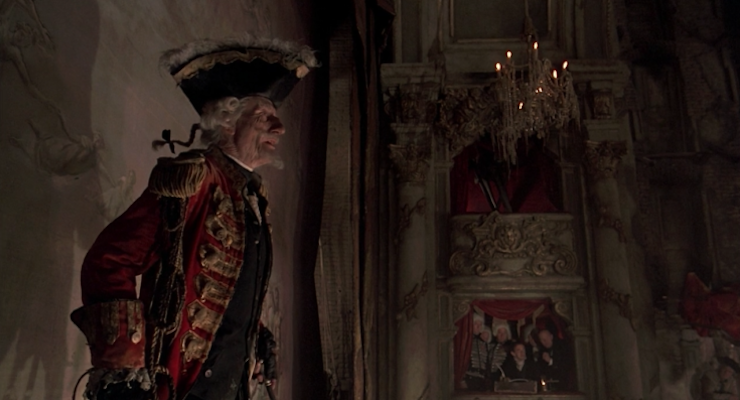
The story of the (fictional) Baron Munchausen, therefore, must have been like catnip to Gilliam, what with the sublime absurdity of his very tall tales, and his blithe rejection of facts as boring inconveniences not worth his consideration. Why tell the truth when the made-up stuff is so much more fun? All the world’s a stage, old chum, and so forth.
Which makes casting John Neville as the titular character particularly inspired, as Neville was far more famous for his theater work than anything else, and brought a grand, well, theatricality to the role that was perfect. I can’t think offhand of anyone else who would have played it better.
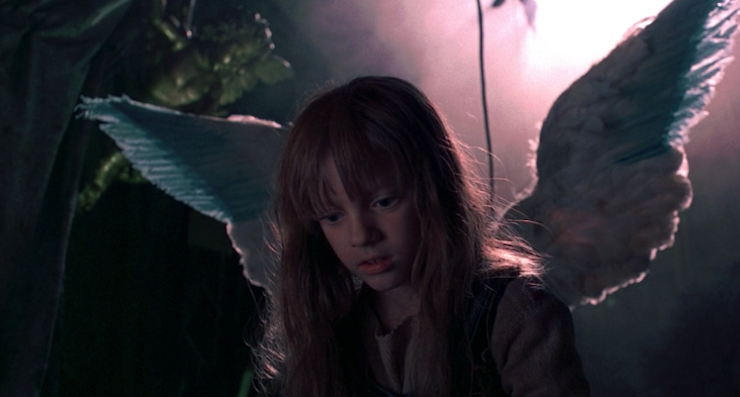
He was well-paired with child actress Sarah Polley as the pragmatic yet full of wonder Sally Salt, who both kept the Baron grounded and inspired him to fresh heights of whimsy, which is a neat trick. I was sad (though not particularly surprised) to learn that Polley had had a terrible time making this movie, and regarded the entire experience as “scarring”. Shame.
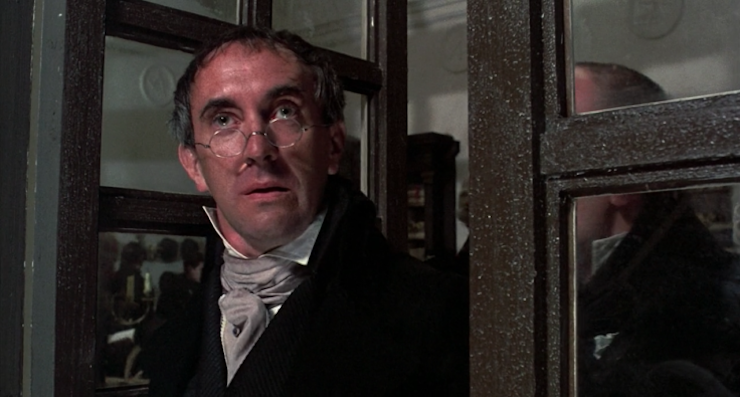
Also notable among the cast was Jonathan Pryce, who traded his hero(ish) turn in Brazil for the villain’s role as the Right Ordinary Horatio Jackson, a man so Teutonically dedicated to the cause of reason and normalcy that he orders the execution of a heroic soldier, because his improbable feats of bravery would be “demoralizing” to average citizens.
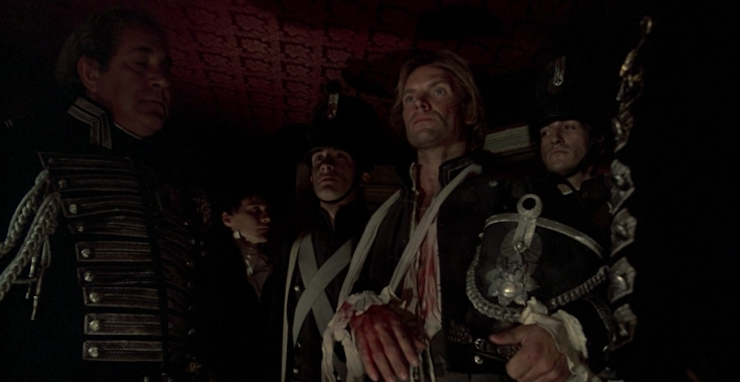
LIZ: Wait, is that Sting?
It is, in fact, Sting. Apparently his cameo in Munchausen came about because he just happened to be Terry Gilliam’s neighbor at the time, which is fairly hilarious.
By far the most startling guest appearance in the movie, though, was one I hadn’t even realized was in it until he appeared on screen.
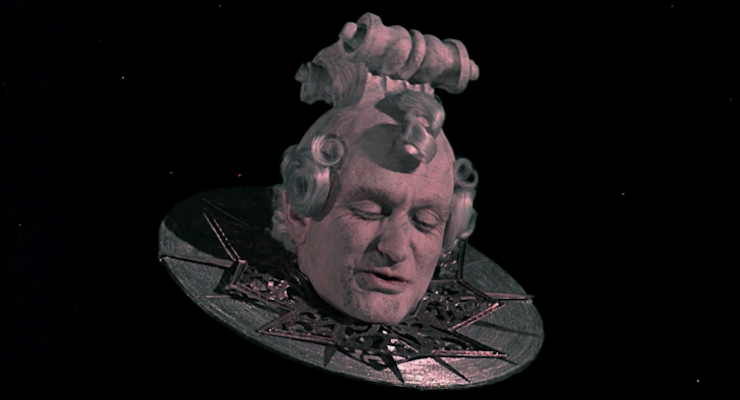
ME: OMGWTF Robin Williams.
This role was, believe it or not, originally intended for Sean Connery, of all damn people, but increasing shortfalls in both time and money meant that the previously much more extensive “the Baron goes to the Moon” sequence got drastically downsized, and Connery dropped out. Williams’ agent apparently stipulated that Williams not be credited by name, which is why the credits list the King of the Moon as played by “Ray D. Tutto” (itself a joke, as “Rei di Tutto” in Italian means “King of Everything”, which the character considers himself to be). Disappointingly, I can see why Williams didn’t want to be overtly associated with this performance, which was… not his best, honestly, and the Moon sequence overall was definitely one of the weakest bits of the film, in my opinion.
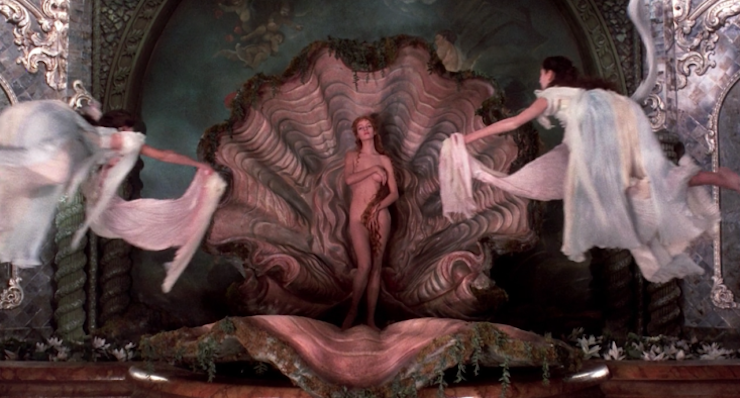
Rather less disappointing was a very young Uma Thurman as the goddess Venus, in one of her earliest film roles. Her entrance, a hilariously faithful recreation of Botticelli’s famous painting Nascita di Venere, is easily one of the most memorable parts of the movie, as is Oliver Reed’s turn as her jealous husband Vulcan.
KATE: I loved Oliver Reed in this. He definitely started me on my whole bad boy thing.
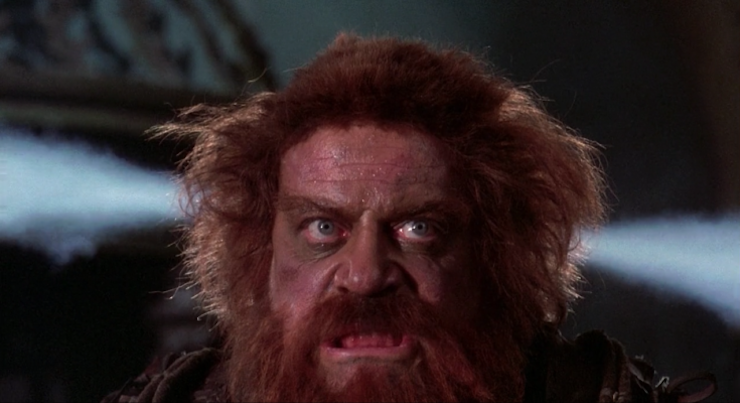
ME: I thought that was Kiefer Sutherland.
KATE: It’s a run-off, okay, shut up.
I can’t say I loved Vulcan screaming at Venus about how she was a whore for canoodling with the Baron, personally, but admittedly that’s consistent with the mythology, so, okay, sigh.
(Weird side note: even after watching the movie, all three of us kept talking about “Aphrodite and Hephaestus” even though they are only ever referred to by their Roman names in the film. Once we noticed this, we agreed that this is because the Greek versions are way awesomer than their poser Roman knockoffs, so there.)
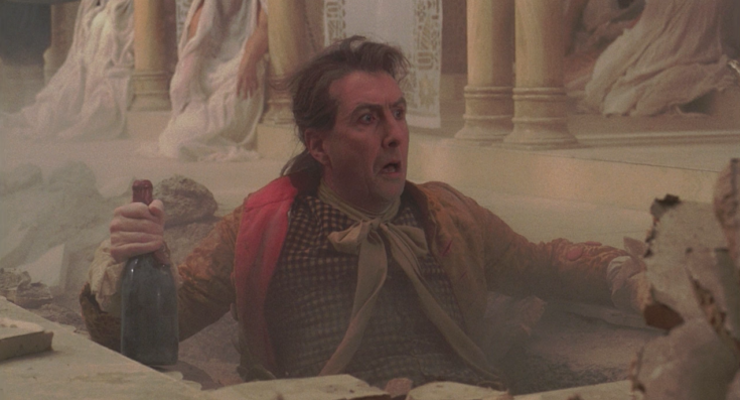
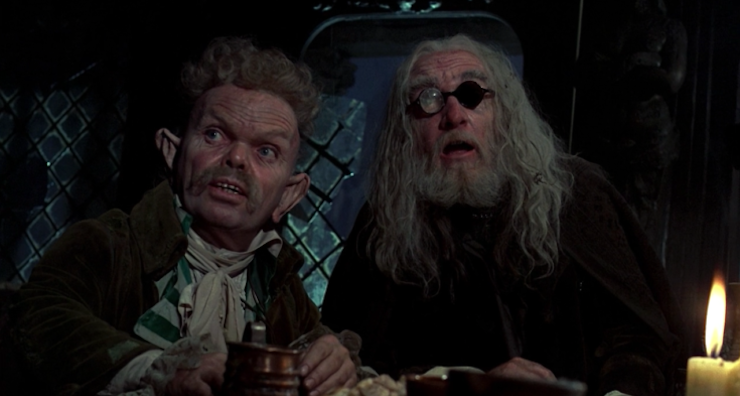
Rounding out the cast is Python alum Eric Idle, who plays Berthold, one of the Baron’s improbably gifted servants/traveling companions, along with Charles McKeown as eagle-eyed sharpshooter Adolphus, Jack Purvis as super-hearing/super-breathed(?) sidekick Gustavus, and Winston Dennis as super-strong Albrecht. McKeown is a longtime collaborative partner of Gilliam’s, and shares writing credit with him on Munchausen. He, along with Purvis and Dennis, appeared in all three of Gilliam’s “trilogy” movies in one capacity or another.
As a side note, we all agreed that in the highly unlikely event that they ever remake this movie, Albrecht’s role absolutely MUST be played by Titus Burgess. (If you don’t know who that is, get thee to a Netflix post haste and watch you some Unbreakable Kimmy Schmidt, you heathen.)
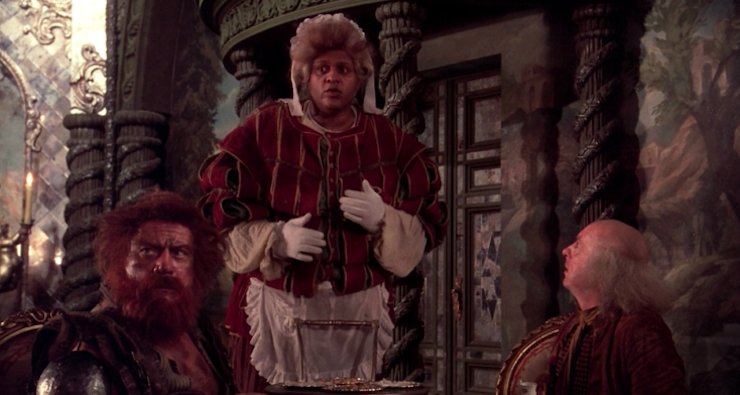
KATE: So what did you think of it, though, overall?
I think, probably, that it was a shame I didn’t get to see this as a child, like Kate did, and be able to so much more easily take uncritical delight in fabulous absurdities like, say, a balloon made entirely of women’s lingerie, without being distracted by thoughts of how much that would never in a million years actually work.
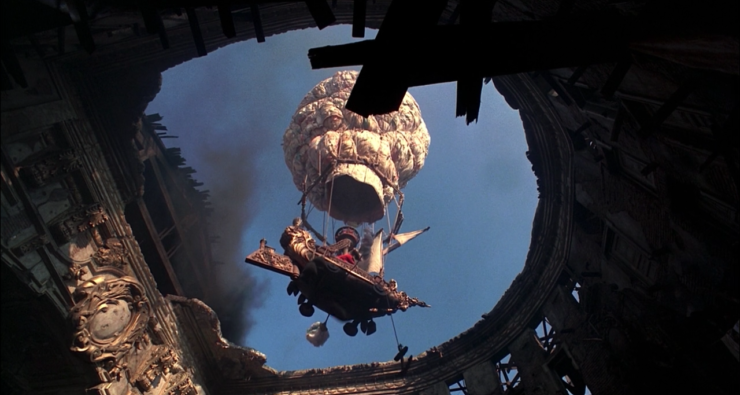
It’s not that I can’t delight in absurdity as an adult, but I can’t help also analyzing it as well. Which is useful for picking out thematic elements and such, but makes it a little harder to indulge one’s suspension of disbelief to the extent Gilliam demands—which is a pretty demanding extent. This movie is hardcore whimsy, y’all; it is not even slightly interested in catering to your need for rational narrative. Which I find admirable, in a way, but also, as a very much non-child these days, a little exhausting as well.
(Brazil is different, because the older you get, the easier it is to believe in dystopias. Yay?)
But hey, look at that, my troubles with the film also happen to dovetail with the entire theme of the film! I.e. the decline or death of imagination is, well, actual decline/aging and actual Death! Right, that’s… not depressing or anything, wow.
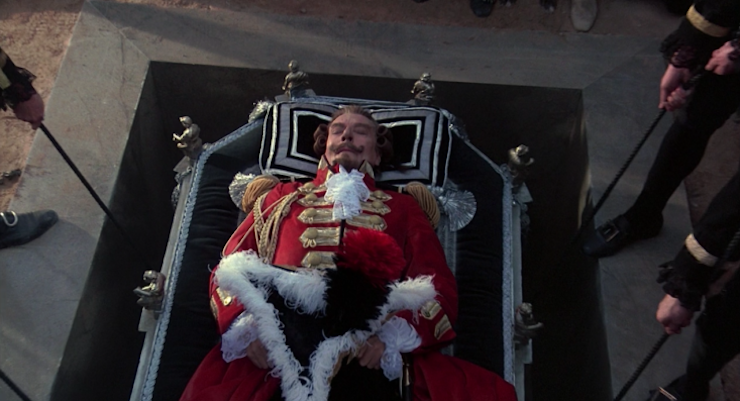
Okay, so I’m going to go try and devise some kind of rejuvenating spa treatment for my whimsy, and meanwhile leave Sister Kate with the final word:
KATE: It’s just stuck with me over the years, how it was sort of sad and funny and inspiring and poetic, and how the Baron never let anyone tell him what was what, because he decided what his life was. He just had moxie, or whatever the word is for that. There are parts of it I wish weren’t in there, and I wish it maybe could have been done better, but it’s one of those movies I’ll never forget.
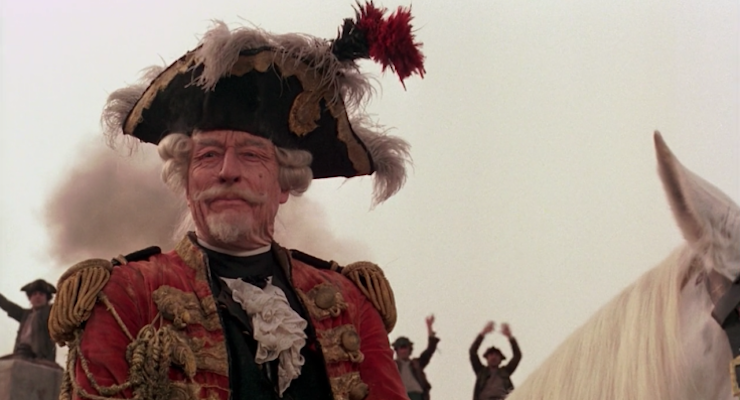
And there you have it. And thus, we end with the Nostalgia Love to Reality Love 1-10 Scale of Awesomeness!
For Kate:
Nostalgia: 8
Reality: 6 (points deducted for Robin Williams, mostly)
For Liz:
Nostalgia: 3
Reality: 7
For me:
Nostalgia: 0
Reality: 6.5
Thus ends the first MRGN of 2018! Tell me your thoughts, O My Peeps, and watch this space for Moar!










